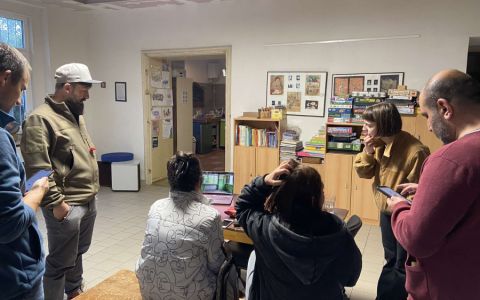Ústí nad Labem- Spolek pro chemickou a hutní výrobu (Chemical and Mining Industrial Company, also Spolchemie) has been granted by the Regional Office of the city Ústí nad Labem the third integrated permission for the production of Epitetra. According to the Integrated Registry of Polluttion report, Spolchemie is the biggest and only producer of the waste which is contaminated by hexachlorbenzene, so called hexa-remains. These substances are produced as an undesirable by-product during the production of Epitetra. A public discussion took place before granting of the third integrated permisson for production of Epitetra.
Participants of the procedure, organisations such as Arnika and Občanská liga Ústí nad Labem (Ústí nad Labem Citizen League) had received an official invitation from the regoinal Office from Ústí. The second integrated permission for the production of Epitetra had been granted in October 2006. Arnika and Občanská liga recalled against this decision of The Regional Office of Ústí nad Labem to The Ministry of Environment which has canceled the decision and returned it for new proceeding.
The objection from Arnika was considered irrelevant by The Ministry of Enviroment, because the request for granting the integrated permission for the production of Epitetra had been considered complete in the time of submitting. Arnika has requested adding a plan for reduction of the waste contaminated by hexa-remains to the application for the granting of the integrated permission for the production of Epitetra. The hexa-remains are persistent organic compounds, dangerous both for the enviroment and human health. Czech Republic has signed the Stockholm Convention, which enacts the reduction of such dangerous waste. The reduction of waste which has been contaminated by the hexa-remains is also a part of The National Plan of Implementation, which was created in 2005 by the Czech government after signing the Stockholm Convention.
Arnika has used the third public discusion as an oportunity to repeat the request for the reduction ot the hexa-remains contaminated waste. Instead of reducing, the production of this waste rises. This is against the Stockholm Convention, which is effectual for the Czech republic. „It is suprising that The ministry of Enviroment isn’t asking Spolchemie for the reduction of hexa-remains contaminated waste, eventhough it is against the Stockholm Convention. We are going to recall to The ministry of Enviroment again and if they reject, we will appeal to the Minister of Enviroment or the competent organs of the European Union“, comented on the situation Martina Stávková from Arnika.
Notes:
(1) Hexachlorbenzene – (HCB) is dangerous for humans, as well as animals, during long-time exposure of certain doses. It damages mostly the liver and kidneys and has negative effects on the endocrine system. Repeated exposure to hexachlorbenzen or long-time exposure can cause damage to the nervous system, irritation, sensitive skin, problems with coordination of movements and walking. For more information please refer to this site.
(2) Hexa-remains are being produced by Spolchemie during production of Epitetra as an undesirable by-product and consist of hexachlorbenzen (PCB) and hexachlorbutedien (HCBD). According to Integrated Registry of Pollution during the years 2004 and 2005, Spolchemie has been the biggest and only producer of the waste contaminated by HCB. In 2004 it was also Fosta inc. that reported emmisions of HCB in outlet water, but only of small measures 0,01 kg/year.






